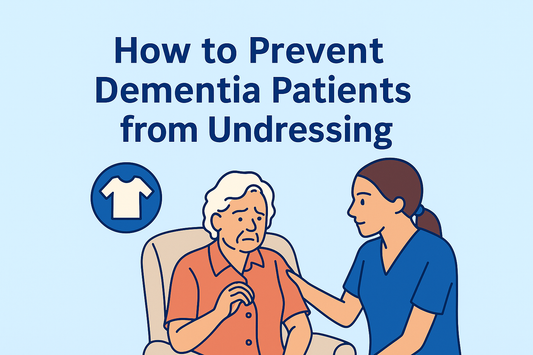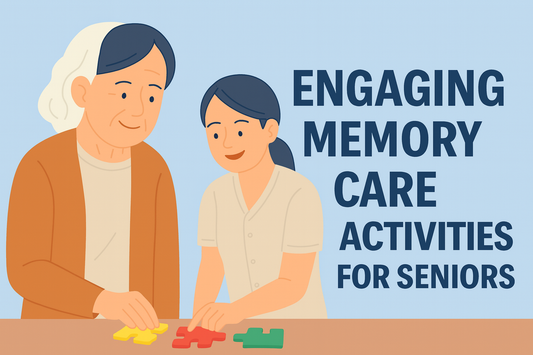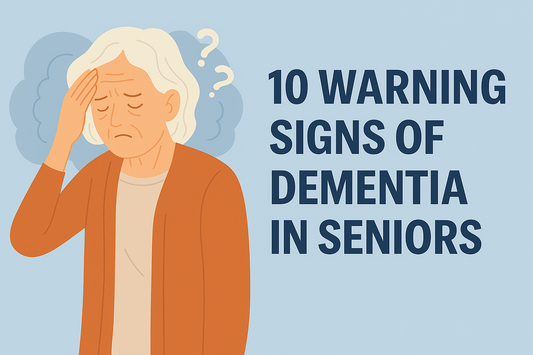
What is Early On-Set Alzheimer’s or Dementia?
Most people, especially those who have friends or family members who are elderly persons, would have heard of the terms, ‘dementia’ and ‘Alzheimer’s’. Many people even use it interchangeably. However, in reality, Alzheimer’s and dementia are not quite the same thing as people may understand it to be.
QUICK LINKS - TOPICS COVERED:
- WHAT IS DEMENTIA?
- WHAT IS ALZHEIMER’S?
- WHAT DOES ‘EARLY ON-SET’ MEAN?
- POSSIBLE CAUSES
- SYMPTOMS
- CHALLENGES
- HOW TO COPE?
- TREATMENT OPTIONS
WHAT IS DEMENTIA?
Dementia is a general term for a decline in mental ability severe enough to interfere with a person’s daily life. It does not refer to specific disease, but instead is an overall term that described a group of symptoms associated with a decline in memory and other cognitive skills severe enough to impede a person’s ability to perform everyday activities.
There are several types of dementia, including Alzheimer’s disease, vascular dementia, Lewy-Body dementia, and many other conditions that can cause symptoms of dementia, including some that are reversible, such as thyroid problems and vitamin deficiencies.
WHAT IS ALZHEIMER’S?
Alzheimer’s, as mentioned above, is a type of dementia. It mainly causes problems with memory, thinking, and behavior. 60 – 80% of dementia cases tend to be Alzheimer’s. Generally, the risk of having Alzheimer’s increases with age, especially for those over 65 years old. The disease is one that is progressive. Therefore, symptoms usually start mild and slowly in the beginning, where some can even be mistaken for aging related deteriorations. However, over a number of years, the progression of Alzheimer’s becomes more pronounced.
During the early stages of Alzheimer’s, a person may still go about their everyday life as they usually do. However, mild memory loss is common. Common difficulties at this stage include:
- Problems coming up with the right word or name
- Trouble remembering names when introduced to new people
- Challenges performing tasks in social or work settings
- Forgetting material that one has just read
- Losing or misplacing things
- Increasing trouble with planning or organizing
By the time a person progresses into the middle stages of Alzheimer’s, which can last for several years, they will require a greater level of care. Although they can still go about doing most activities, they may need some assistance with some tasks such as paying bills or cooking. Symptoms become more pronounced, where memory loss increases and personality and behavioral changes happen.
And when a person enters the late stages of Alzheimer’s, they are almost completely dependent on a caregiver to fulfill all of their needs. By this stage, a person would lose the ability to respond to their environment, to carry on conversation, and eventually, to control movement.
DIFFERENT FORMS OF CBD
CBD can be available in several different forms. They are:
- Oil
- Isolate
- Crystals
- Wax
- E-liquids
Of those listed above, oils, isolates, and wax forms are the main types of CBD available in stores.
Furthermore, each of these forms can be available in one or more of different types of products. These include, but are not limited to:
- Oils
- Tinctures
- Creams and Gels
- Capsules
- Sublingual Sprays
- Transdermal Patches
- Vapors
WHAT DOES ‘EARLY ON-SET’ MEAN?
Early on-set dementia is a term that is used to describe any form of dementia diagnosed in individuals under the age of 65. Accordingly, those aged below 65 who are diagnosed with Alzheimer’s are said to have early on-set Alzheimer’s. It is the most common type of dementia in younger people and may affect around one-third of all early on-set dementias. In the US, there are an estimated 200,000 people who have early on-set.
A key difference with early on-set Alzheimer’s is that patients are much more likely to have an ‘atypical’ form of Alzheimer’s than older people. Atypical Alzheimer’s is when instead of memory loss, the first symptoms are usually problems with vision, speech, or planning, decision-making and behavior, instead of memory loss. It accounts for nearly one-third of all early on-set Alzheimer’s.
POSSIBLE CAUSES
The cause of early on-set dementia or Alzheimer’s is still quite unclear. Although early on-set Alzheimer’s can be genetic in some cases, individuals in their 30s, 40s, and 50s develop symptoms, it accounts for less 1% of all Alzheimer’s cases.
SYMPTOMS
Often those people who develop early on-set dementia have a very different lifestyle compared to those who develop dementia after the age of 65. One main difference is that younger individuals tend to have a full-time job. They may also be actively raising and be financially responsible for a family. Therefore, the onset of dementia can present a different set of symptoms and challenges.
A person may start forgetting minor things at work. They may suddenly develop a habit of writing many things down to avoid forgetting them. They may confuse appointments and schedules and easily become overwhelmed at unexpected changes. Learning new tasks can also become difficult and make them less flexible. When many of these symptoms appear in the person, it can cause their personality to shift slightly and become more on the edge.
CHALLENGES
Due to the age factor, often symptoms of early on-set Alzheimer’s or dementia can be misdiagnosed. Health care providers don’t usually look for the disease in younger people. Symptoms may be incorrectly attributed to stress or other factors. Sometimes there may even be conflicting diagnoses from different health care professionals.
With younger people generally having more active responsibilities on their shoulders, it is crucial to get an accurate diagnosis of early on-set dementia so that they and their loved ones have sufficient time to accept their diagnosis and make the necessary financial and legal preparations for their family and loved ones.
HOW TO COPE?
Some of the biggest changes in the life of a person with early on-set dementia will be related to their job and their social circle. Sometimes an employer can be understanding and allow you take on a lighter workload for some time. However, eventually the person’s loss of income is inevitable. Outside of work, they may face stigmas and stereotypes about the disease due to the young age of diagnosis.
At Work
Soon after diagnosis, speak to your employer and explore your options. For example:
- Find out if your job scope can be modified or take on a lighter load to better suit your emerging limitations
- Familiarize yourself with your benefits and find out if there is an employee assistance program available
- Explore what benefits may be offered to you under your government’s disabilities assistance.
For Couples
Any long-term illness in general can strain a couple’s relationship. With a diagnosis such as early on-set dementia, it is more pronounced due to the inevitable loss and loneliness of the spouse. Knowing that one’s spouse’s health will slowly deteriorate until they are no more can cause many struggles and complications in their day to day lives.
First and foremost is the difficult time they will have in accepting the huge change that has occurred in their lives. Once they’ve come to terms with the diagnosis, there are several things that couples can do in order to ensure as less stress as possible for parties:
- Discuss about the kind of help you will need from each other at different stages of the dementia’s progression. Don’t be afraid of asking for help.
- Continue doing activities together as a couple and plan for modifications and adaptations as the dementia progresses. You can also try to find new activities that both can enjoy.
- Collate and organize resources that you might needs over the course of the disease.
- Speak to a couple’s counsellor to help you discuss the issues and challenges in the relationship arising from the disease.
Involving Children
Often those who are diagnosed with early on-set dementia have children, who do not yet understand what is happening around them. They may blame themselves or others, become angry or react in a number of ways. Therefore, it is important to involve children in a positive manner and not try to keep them away from the illness.
Try the following things with them:
- Find activities that you can enjoy with them
- Speak to your children honestly about what you’re experiencing and what will come as the disease progresses. Help them understand the diagnosis in a way that suits their age.
- Find a support group for children and invite your kids to join you in your counseling sessions. Involve your child’s school counselor and social worker if you have one.
- Make a written, audio, or video diary of your thoughts, feelings, and experiencing for your children. It’ll give them something of yours to remember.
Financial Issues
Often those who are diagnosed with early on-set dementia have to eventually quite their job. The resulting loss of income can be quite a strain on them and their family, with household costs and the newly arisen medical care costs on them. This is even more pronounced if the other spouse doesn’t work or also has to quite to become a full-time caregiver.
Some medical benefits and many social-support programs wont’ provide assistance unless the person with dementia is older than 65 years of age. Younger individuals may need special waivers to get into such programs. To deal with the financial challenges, you can do the following:
- Speak with a financial planner and an attorney to help you plan for your future financial needs.
- Discuss with your employer if early retirement can be considered as an option.
- Explore the benefits that may be available to you through social security, Medicare, or Medicaid.
- Organize all financial documents and ensure that your spouse or partner understand and can manage your family’s finances.
TREATMENT OPTIONS
Although there is no cure for Alzheimer’s and dementia currently, there are medications that can slow the progress and allow you to manage the symptoms better. It can also give you more time to live independently. For example, doctors may prescribe drugs to help with memory loss, such as:
- Donepezil
- Galantamine
- Memantine
- Rivastigmine
Doctors may also prescribe sleeping pills or antidepressants to manage other dementia related problems such as insomnia, night terrors, and anxiety.
Besides medications, it is also important to keep yourself active and healthy, mentally and physically. Keep up with activities that you still enjoy as long as you can. Try meditation or yoga to relieve stress.



